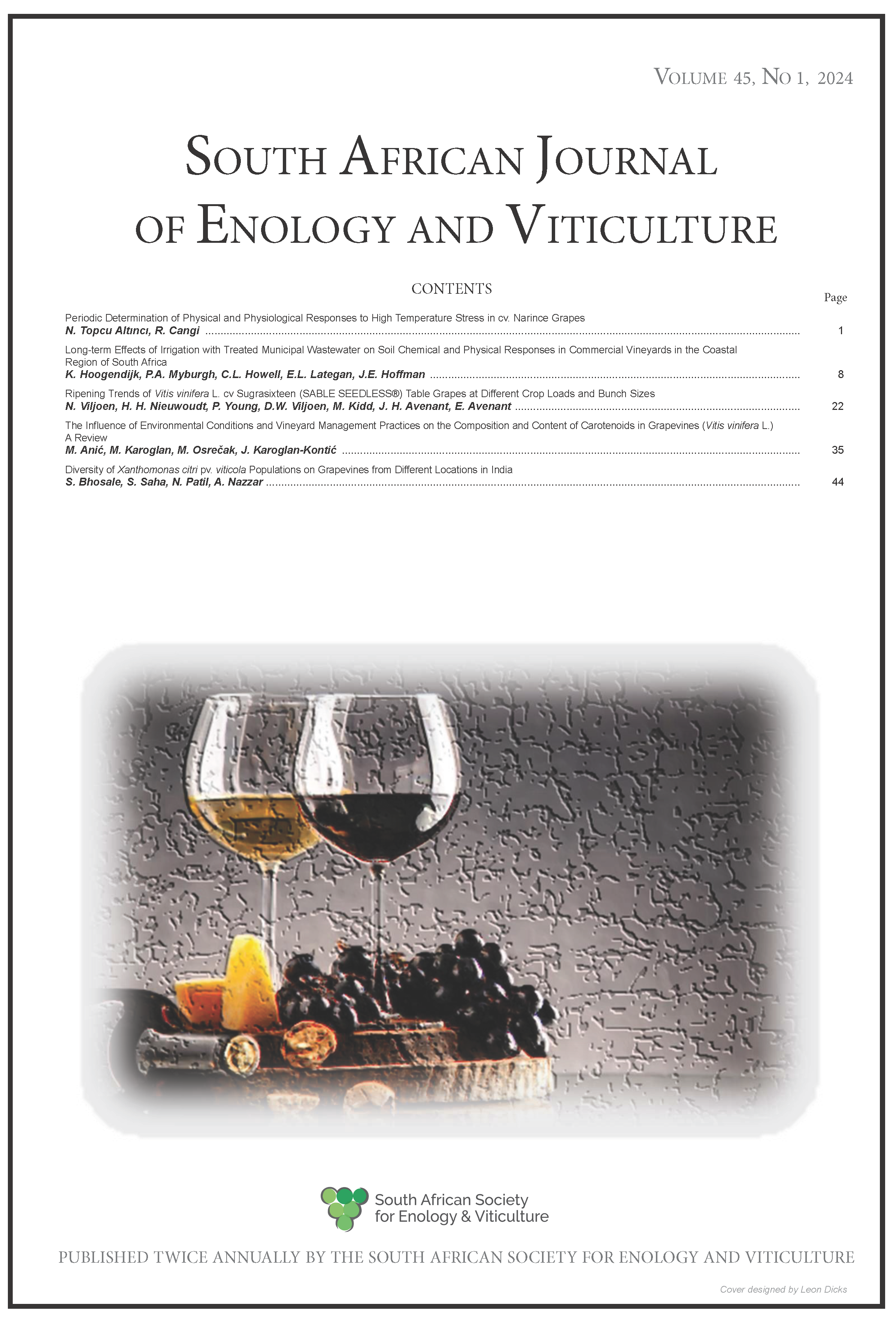Long-term Effects of Irrigation with Treated Municipal Wastewater on Soil Chemical and Physical Responses in Commercial Vineyards in the Coastal Region of South Africa
DOI:
https://doi.org/10.21548/45-1-6143Abstract
The prolonged drought in the Western Cape province of South Africa in recent years has been particularly detrimental to the wine industry. Water restrictions imposed by authorities and the limited supply of fresh water that can be stored, have emphasisedthe need for alternative water sources for vineyard irrigation. Treated municipal wastewater has been used successfully as an alternative source of irrigation water in other countries. A long-term trial was conducted in commercial vineyards in the Coastal region of South Africa to assess the impact of treated municipal wastewater irrigation on vineyards. Cabernet Sauvignon and Sauvignon blanc grapevines were irrigated using treated municipal wastewater from the Potsdam wastewater treatment works for 11 years. Grapevines were either rainfed (RF), irrigated with treated municipal wastewater via a single dripper line (SLD), or received twice the volume of wastewater via a double dripper line (DLD). Irrigation using treated municipal wastewater increased soil pH(KCl), the electrical conductivity of the saturated extract (ECe) and Cl-. Substantial amounts of Na+ and K+ accumulated in the topsoil due to irrigation with treated municipal wastewater. These soil K+ increases could have a negative effect on wine colour stability should the levels of soil K+ be such that they are absorbed excessively by grapevines. The near-saturation hydraulic conductivity (Kns) at the surface of the soil could be related to the ECe in the topsoil. The results represent specific in-field situations in three commercial vineyards under one set of climatic conditions.
Downloads
Downloads
Published
How to Cite
Issue
Section
License
A copyright form will be e-mailed to the corresponding author when the manuscript has been accepted for publication.
In principle, the Author agrees to the following when he/she signes the copyright agreement:
I hereby assign to the SOUTH AFRICAN SOCIETY FOR ENOLOGY AND VITICULTURE (SASEV) the copyright of the text, tables, figures, supplementary material, illustrations and other information (the Material) submitted with the manuscript to be published in SOUTH AFRICAN JOURNAL OF ENOLOGY AND VITICULTURE (SAJEV) (the "Article"). The copyright becomes effective from the date the Article has been accepted for publication in SAJEV.
This is an open access journal, and the authors and journal should be properly acknowledged, when works are cited.
Author's may use the publishers version for teaching purposes, in books, theses, dissertations, conferences and conference papers.
A copy of the authors' publishers version may also be hosted on the following websites:
- Non-commercial personal webpage or blog.
- Institutional webpage.
- Authors Institutional Repository.
The following notice should accompany such a posting on the website: This is an electronic version of an article published in SAJEV, Volume XXX, number XXX, pages XXX - XXX, DOI. Authors should also supply a hyperlink to the original paper or indicate where the original paper (www.journals.ac.za/index.php/sajev/) may be found.
Authors publishers version, affiliated with the Stellenbosch University will be automatically deposited in the University's Institutional Repository SUNScholar.
Articles as a whole, may not be re-published with another journal.
The following license applies:
Attribution CC BY-NC-ND 4.0

